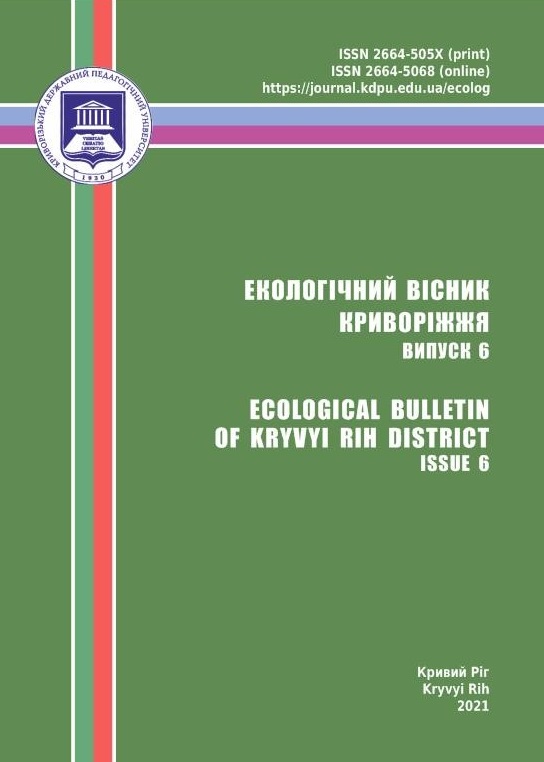THEORETICAL AND METHODOLOGICAL PRINCIPLES ON THE QUALITY OF PROFESSIONAL ECOLOGICAL EDUCATION IN HIGHER EDUCATION
DOI:
https://doi.org/10.31812/eco-bulletin-krd.v6i0.4566Keywords:
balanced development, professional ecological education, future ecologists, professional training, university, professional competence, contextual approachAbstract
Today, the system of higher environmental education in Ukraine is
at a complex and responsible stage of improvement, adhering to the concept
of balanced development, which corresponds to a comprehensive balanced
combination of natural, man — made, environmental, legal and socio-cultural
approaches.
One of the main tasks of higher environmental education is the formation
of students’ understanding of their own future in professional activities,
the ability to analyze environmental problems and their solutions based
on the ecological model of harmony with nature, which is defined as an
environmental paradigm based on the teachings of V. I. Vernadsky, who
advocated a mechanism to ensure the harmony of humanity and nature.
Created on thebasis of democratic and ekologo-humanism orientiriv the system
of trade ecological education is called to provide preparation creatively of active
personality, able to build the country as society which develops on principles
of socioprirodnoy harmony.
The change in the national educational paradigm is due to the needs of society
and personality with the transformation of beliefs, the establishment of new
values, the widespread introduction of new pedagogical technologies, shifts the
emphasis of education from the principle of adaptability to the principle of
competence.
In world practice, one of the most promising areas for improving the quality
of vocational environmental education is the competence approach, which is
based on the idea of key competencies proposed by experts of the Council of
Europe in the early 1990 s.
Downloads
Metrics
References
2. Verbickij, A. A., & Kalashnikov, V. G. (2010.) Kategorija “kontekst” v psihologii i pedagogike: monografija. [Category “context” in psychology and pedagogy: monograph]. Moscov: Logos, 300. (in Russian).
3. Gnilusha, N. V. (2014). Filosofski problemi teoriyi i metodologiyi ekologichnoyi osviti u konteksti profesijnoyi osviti [Philosophical problems of the theory and methodology of environmental education in the context of vocational education] zbirnik naukovih prac “Osvita doroslih: teoriya, dosvid, perspektivi” / redkol. L. B. Luk’yanova (golova) ta in.: In-t ped. osviti i osviti doroslih NAPN Ukrayini. [a collection of scientific papers “Adult education: theory, experience, prospects” / editor. L. B. Lukyanov (chairman) and others.: Inst. Of Pedagogical Education and Adult Education of the National Academy of Pedagogical Sciences of Ukraine]. Kyiv; Luhansk: KNOWLEDGE Publishing House, Issue.1 (8), 19–27. (in Ukrainian).
4. Kuzminskij, A. I. (2005). Pedagogika vishhoyi shkoli [Tekst]: navch. posib. [Pedagogy of higher school [Text]: textbook]. Kyiv: Knowledge, 184. (in Ukrainian).
5. Pobirchenko, N. A. (2012). Nauka i praktika kompetentnisnogo vimiru osobistisnogo zrostannya uchnivskoyi molodi. [Science and practice of competence measurement of personal growth of student youth] Kompetentnisnij vimir osobistisnogo zrostannya uchnivskoyi molodi: teoriya, praktika, dosvid. Materiali Vseukrayinskoyi naukovopraktichnoyi konferenciyi, 10–11 kvitnya 2012 r.; redakcijna kolegiya: Pobirchenko N. A., Pashkov V. V. [Competence dimension of personal growth of student youth: theory, practice, experience. Proceedings of the All-Ukrainian scientific-practical conference, April 10–11, 2012; editorial board: Pobirchenko N. A., Pashkov V. V.]. Zaporozhye: “Accent Invest-Trade”, 11–18 (in Ukrainian).
6. Ursul, A. D. (2001). Model operezhayushhego obrazovaniya[Model of advanced education]. Filosofiya jekologicheskogo obrazovaniya [Philosophy of environmental education]. Moscov: Progress-Tradition, 50. (in Russian).






